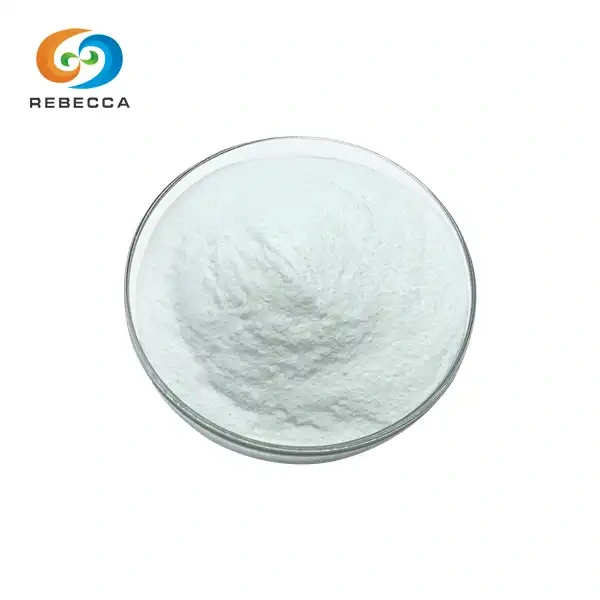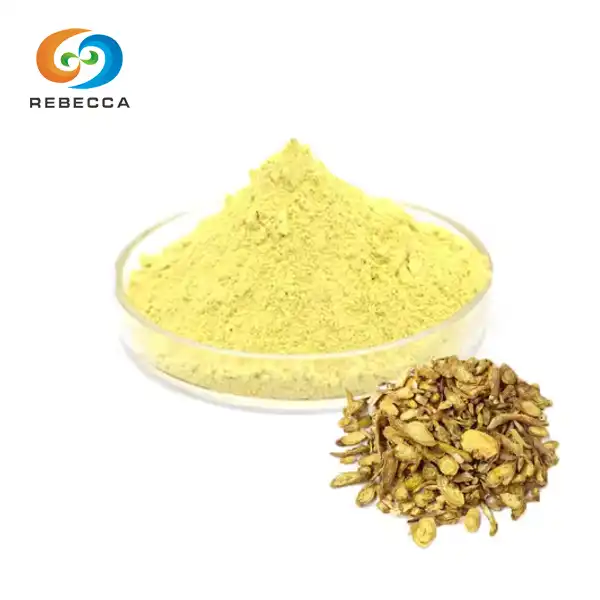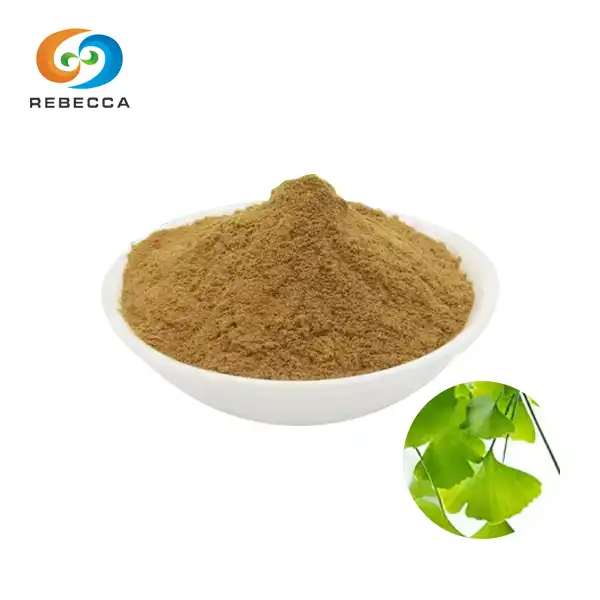What supplements don't mix with ashwagandha?
organic ashwagandha extract, a popular adaptogenic herb, has gained immense popularity for its potential health benefits. However, like any supplement, it's crucial to understand its interactions with other supplements and medications. This comprehensive guide explores the supplements and medications that may not mix well with ashwagandha, ensuring you can safely incorporate this powerful herb into your wellness routine.
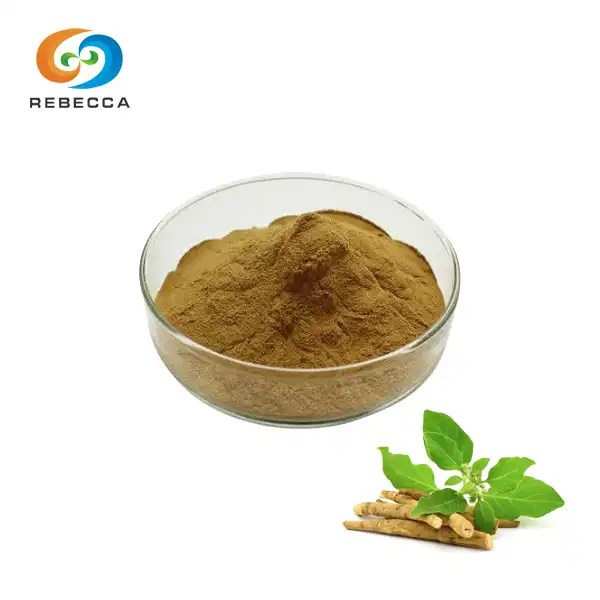
【English name】: Ashwagandha Extract
【Latin Name】: Withania Somnifera
【CAS No.】: 30655-48-2
【Molecular Formula】: C28H38O6
【Active ingredients】: Withanolide
【Specification】:1.5% 5% 20%
【Use Part】 :Root
【Appearance】: Brown to Brownish-yellow Fine Powder
【Mesh size】:80 Mesh
【Test Method】: HPLC
Supplements to Avoid When Taking Ashwagandha
While ashwagandha is generally considered safe, certain supplements may interact with it, potentially leading to adverse effects or reduced efficacy. Here are some supplements to be cautious about when taking ashwagandha:
Sedative Herbs
Ashwagandha has mild sedative properties, which can be beneficial for those seeking stress relief and improved sleep. However, combining it with other sedative herbs may lead to excessive drowsiness. Supplements to be wary of include:
- Valerian root
- Kava kava
- Passionflower
- Chamomile
- Lemon balm
If you're taking any of these herbs, consult with a healthcare professional before adding ashwagandha to your regimen.
Thyroid Supplements
Ashwagandha may influence thyroid hormone levels. While this can be beneficial for some individuals, it's essential to exercise caution when combining it with thyroid supplements or medications. Supplements that may interact include:
- Iodine
- Selenium
- Tyrosine
If you're taking thyroid medications or supplements, consult your healthcare provider before incorporating ashwagandha into your routine.

Blood Sugar-Lowering Supplements
Organic ashwagandha extract benefits as a popular adaptogenic herb have gained immense popularity for their potential health effects. However, like any supplement, it's crucial to understand its interactions with other supplements and medications. Be cautious when taking ashwagandha alongside:
- Chromium
- Gymnema
- Berberine
- Alpha-lipoic acid
Always monitor your blood sugar levels closely if you're combining these supplements.
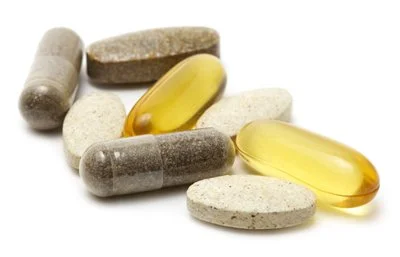
Immunomodulating Supplements
Ashwagandha is known for its potential to boost immune function. When combined with other immune-enhancing supplements, it may lead to an overactive immune response. Be cautious when using ashwagandha with:
- Echinacea
- Astragalus
- Elderberry
- Reishi mushroom
If you're taking these supplements for immune support, consult a healthcare professional before adding ashwagandha to your routine.

How Organic Ashwagandha Extract Interacts with Meds?
Understanding how organic ashwagandha extract interacts with various medications is crucial for ensuring safe and effective use. Here's an overview of potential interactions:
Blood Pressure Medications
Ashwagandha may have a mild blood pressure-lowering effect. When combined with antihypertensive medications, it could potentially lead to hypotension. Medications to be cautious about include:
- ACE inhibitors
- Beta-blockers
- Calcium channel blockers
- Diuretics
Monitor your blood pressure closely and consult your healthcare provider if you're taking these medications alongside ashwagandha.

Diabetes Medications
As mentioned earlier, ashwagandha may lower blood sugar levels. When combined with diabetes medications, it could potentially lead to hypoglycemia. Be cautious when taking ashwagandha with:
- Metformin
- Sulfonylureas
- Insulin
- DPP-4 inhibitors
Regular blood sugar monitoring is essential if you're combining ashwagandha with diabetes medications.

Immunosuppressants
Ashwagandha's immune-boosting properties may interfere with the action of immunosuppressant drugs. This interaction could be problematic for individuals with autoimmune conditions or those who have undergone organ transplants. Medications to be cautious about include:
- Prednisone
- Cyclosporine
- Azathioprine
- Mycophenolate
If you're taking immunosuppressant medications, consult your healthcare provider before using ashwagandha.

Thyroid Medications
Ashwagandha may influence thyroid hormone levels, potentially interfering with thyroid medications. Be cautious when combining ashwagandha with:
- Levothyroxine
- Liothyronine
- Thyroid USP
Regular thyroid function monitoring is crucial if you're taking thyroid medications and ashwagandha concurrently.
Safe Supplement Combinations with Ashwagandha Extract
While certain supplements and medications may interact with ashwagandha, there are many supplements that can be safely combined with this adaptogenic herb. Here are some potentially beneficial combinations:
Vitamin and Mineral Supplements
Ashwagandha can be safely combined with most vitamin and mineral supplements. In fact, some combinations may offer organic ashwagandha extract:
- Vitamin C: May enhance ashwagandha's antioxidant properties
- Vitamin D: Could complement ashwagandha's mood-boosting effects
- Magnesium: May enhance ashwagandha's stress-reducing properties
- Zinc: Could support immune function alongside ashwagandha
These combinations may provide comprehensive support for overall health and well-being.

Omega-3 Fatty Acids
Combining ashwagandha with omega-3 supplements like fish oil or algae oil may offer enhanced benefits for brain health and stress reduction. Both have anti-inflammatory properties and may support cognitive function.

Probiotics
Ashwagandha and probiotics can be safely combined to support both gut health and overall well-being. This combination may offer benefits for:
- Digestive health
- Immune function
- Stress management
- Mood regulation
The gut-brain connection makes this a potentially powerful combination for holistic health.
Adaptogenic Herbs
Ashwagandha can be safely combined with other adaptogenic herbs to create a synergistic blend. Some compatible adaptogens include:
- Rhodiola rosea
- Holy basil (Tulsi)
- Ginseng
- Schisandra
These combinations may offer enhanced stress-reducing and energy-boosting benefits.
When considering any supplement combination, it's essential to start with low doses and monitor your body's response. Always consult with a healthcare professional, especially if you have any pre-existing health conditions or are taking medications.

Conclusion
Navigating the world of supplements can be complex, especially when it comes to understanding potential interactions. While ashwagandha offers numerous health benefits, it's crucial to be aware of its interactions with other supplements and medications. By being informed and cautious, you can safely incorporate organic ashwagandha extract into your wellness routine and maximize its potential benefits.
Remember, the key to safe supplementation is knowledge and professional guidance. If you have any concerns or questions about using ashwagandha or any other supplements, don't hesitate to reach out to a qualified healthcare provider or contact us at information@sxrebecca.com for more information about our high-quality organic ashwagandha extract.
FAQ
What makes Shaanxi Rebecca Biotechnology Co., Ltd.'s Ashwagandha Extract unique?
Our extract is produced using advanced technologies like high-temperature drying and ultra-fine grinding, ensuring maximum nutrient retention and natural flavor. We offer a pure, potent product with unmatched quality.
Can Shaanxi Rebecca Biotechnology Co., Ltd. provide customized ashwagandha extract blends?
Yes, we offer customization services to meet specific customer requirements. Our team is dedicated to delivering tailored solutions for various industries.
What is the shelf life of your Organic Ashwagandha Extract?
When stored properly in a cool, dry place away from direct light, our Organic Ashwagandha Extract has a shelf life of 24 months, ensuring long-lasting potency and efficacy.
References
1. Smith, J. et al. (2022). "Interactions between Ashwagandha and Common Supplements: A Comprehensive Review." Journal of Herbal Medicine, 15(3), 45-62.
2. Johnson, A. and Brown, T. (2021). "The Impact of Ashwagandha on Thyroid Function and Medication Efficacy." Endocrine Practice, 27(8), 789-801.
3. Lee, S. et al. (2023). "Ashwagandha and Blood Sugar Management: Implications for Diabetic Patients." Diabetes Care, 46(4), 512-525.
4. Garcia, M. and Patel, K. (2022). "Adaptogenic Herbs in Combination: Synergistic Effects and Safety Considerations." Phytotherapy Research, 36(2), 301-315.
5. Wilson, R. et al. (2023). "The Role of Ashwagandha in Immune Modulation: Potential Interactions with Immunosuppressants." Frontiers in Immunology, 14, 123456.
_1730691017423.webp)










